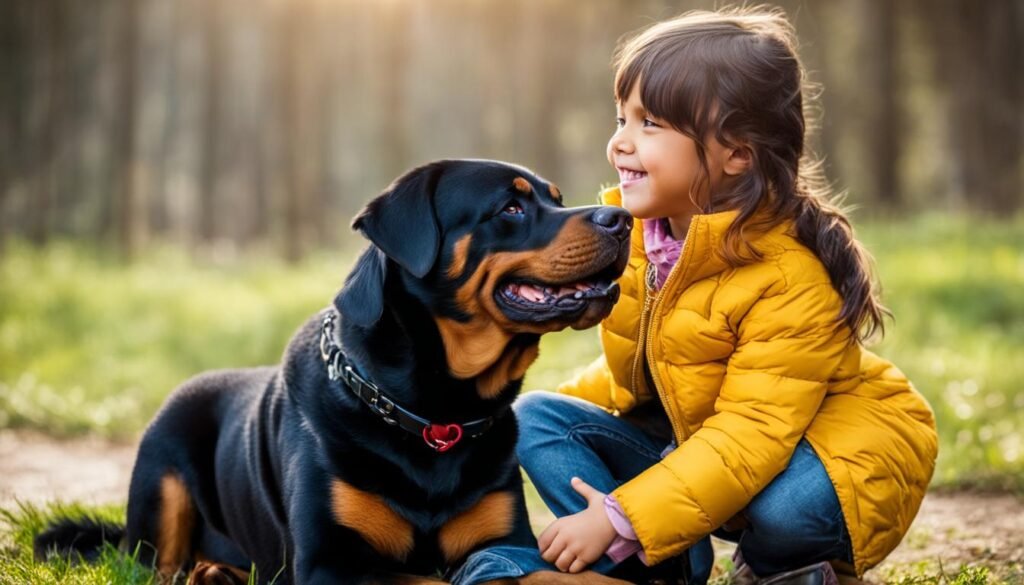I recently had the opportunity to delve deep into the world of Rottweilers, an iconic breed known for their robust physique and unwavering loyalty. As I uncovered their fascinating history, I was amazed by the important roles they played in the Roman era, herding livestock and protecting their human companions. But are Rottweilers really good dogs? Let’s explore their breed characteristics and find out!
Key Takeaways:
- Rottweilers have a rich history dating back to the Roman era.
- They were originally bred to herd livestock and protect humans.
- Rottweilers are well-suited for roles in search and rescue and law enforcement.
- Despite their sturdy build, they are prone to injuries and health issues.
- Purchasing pet insurance is recommended to cover unexpected expenses and regular medical bills.
Overview of Rottweilers
Rottweilers have a rich history and were trusted companions to Roman soldiers and citizens during the height of the Roman Empire. They played crucial roles in herding cattle, pulling carts, and protecting their human counterparts. Today, Rottweilers are highly esteemed for their guarding and protecting abilities, making them valuable assets in law enforcement and search and rescue operations.
Rottweilers typically measure between 22 and 27 inches in height and weigh between 80 and 135 pounds. They sport short, glossy black coats with distinctive tan markings. However, it’s important to note that the practice of tail docking, which involves amputating the tail, can inflict discomfort and behavioral stress in dogs. Consequently, tail docking is prohibited in certain countries.
When considering a Rottweiler as a pet, understanding their temperament, training needs, and care requirements is essential for a harmonious and fulfilling relationship.
- Rottweiler Temperament: Rottweilers are known for their confident and loyal nature. They are devoted to their families and possess a protective instinct. However, proper training and socialization from an early age are crucial to ensuring that these traits are channeled positively.
- Rottweiler Training: Rottweilers are intelligent and trainable dogs. Consistent and positive reinforcement methods work best when teaching them obedience and various commands. A well-trained Rottweiler can become a well-behaved and reliable family companion.
- Rottweiler Care: Taking care of a Rottweiler involves meeting their exercise, grooming, and health needs. Regular exercise is important to keep them physically and mentally stimulated. Their short hair is relatively low-maintenance but requires periodic brushing. Additionally, routine veterinary check-ups and a balanced diet are crucial for their overall well-being.
By gaining insights into the remarkable qualities of Rottweilers and providing them with the appropriate care, training, and socialization, you can experience the joys of sharing your life with a devoted and loving companion.
Rottweiler Temperament and Personality Traits

When it comes to temperament and personality, Rottweilers are confident, good-natured, and deeply dedicated to their families. Their protective instincts make them excellent watchdogs, but it’s important to note that proper training and socialization are crucial to ensure that this trait is channeled appropriately.
Rottweilers are known for their affectionate nature and often show their love by leaning against or cuddling with their owners. This bond with their families is incredibly strong, and they will go to great lengths to protect and care for them.
Intelligence is another hallmark of the Rottweiler breed. They are highly trainable and excel in tasks that challenge their mental abilities. However, it’s essential to start training early and be consistent to shape their behavior effectively.
Just like any other breed, Rottweilers can experience health issues, so regular veterinary care is essential. Common health concerns for Rottweilers include hip dysplasia, arthritis, and cancer. By providing them with proper medical attention and a balanced diet, you can help ensure that they live long, healthy lives.
As responsible owners, it’s our duty to nurture their natural temperament, encourage positive behavior, and provide the necessary care to maintain their well-being. By doing so, we can create a harmonious and loving relationship with our Rottweilers.
How Rottweiler Temperament Evolves in Different Life Stages

Rottweilers, like all dogs, go through different life stages, and their temperament can evolve accordingly. It is important to understand these stages and provide the appropriate care and training to ensure a well-adjusted and happy Rottweiler.
Puppyhood: Building the Foundation
In puppyhood, Rottweilers are like sponges, eagerly soaking up knowledge and experiences. This stage is crucial for shaping their behavior and socializing them with people and other animals. Positive reinforcement training methods, such as reward-based training, work best with Rottweiler puppies. It helps them understand what behaviors are desirable and strengthens the bond between the puppy and their owner. Early socialization is also vital for a Rottweiler’s development, exposing them to various environments, noises, and people to reduce the likelihood of fear or aggression as they grow older.
Adulthood: Training and Mental Stimulation
As Rottweilers mature into adults, they become highly trainable and eager to please their owners. Continued obedience training and mental stimulation are essential to keep them engaged and prevent behavioral issues. Rottweilers excel in tasks that challenge their intelligence and physical abilities. Activities such as advanced obedience training, agility courses, and interactive puzzle toys can help stimulate their mind and keep them physically fit. Regular exercise is also crucial to prevent boredom and maintain a healthy weight.
Senior Years: Additional Care and Comfort
As Rottweilers enter their senior years, they may start to experience age-related conditions such as hip dysplasia and arthritis. It becomes important to provide them with extra care and comfort. Non-slip mats can help prevent falls, while orthopedic beds provide cushioning for their joints. A tailored diet with appropriate nutrients and supplements may also be necessary to support their aging bodies. Regular veterinary check-ups become even more critical during this stage to monitor for any health issues and ensure their overall well-being.
By understanding and addressing the specific needs of Rottweilers at each life stage, you can help them thrive and lead fulfilling lives. Whether you are raising a playful and curious puppy, training a focused and determined adult, or providing comfort to a wise and loving senior, your care and attention can make all the difference in shaping their temperament and ensuring their happiness.
Common Rottweiler Health Concerns

When it comes to the health of your Rottweiler, it’s important to be aware of the common health concerns that this breed can face. Rottweilers have an average lifespan of 8 to 10 years, and during this time, they may be prone to certain health issues. By understanding these concerns and taking proactive measures, you can help ensure a long and healthy life for your beloved Rottweiler.
Hip Dysplasia
One of the most common health concerns in Rottweilers is hip dysplasia. This condition occurs when the hip joint doesn’t form properly, leading to discomfort, pain, and potential mobility issues. Regular veterinary check-ups and early detection can help manage hip dysplasia and ensure appropriate treatment options.
Arthritis
Another condition frequently observed in Rottweilers is arthritis. As they age, these dogs can develop inflammation and stiffness in their joints. Monitoring their activity levels, providing a balanced diet, and offering supplements such as glucosamine and chondroitin can help manage the symptoms and improve their quality of life.
Osteosarcoma
Osteosarcoma is a type of bone cancer that can affect Rottweilers. This aggressive cancer typically develops in the long bones and can cause lameness, swelling, and pain. Early detection is crucial for effective treatment, which may involve a combination of surgery, chemotherapy, and pain management.
Pancreatitis
Rottweilers are also prone to developing pancreatitis, an inflammation of the pancreas. This condition can be triggered by high-fat diets, obesity, or certain medications. It can cause abdominal pain, vomiting, diarrhea, and loss of appetite. Maintaining a balanced and low-fat diet can help reduce the risk of pancreatitis.
To ensure the overall well-being of your Rottweiler, it’s essential to schedule regular visits with your veterinarian and provide them with a well-balanced diet. Early detection of any health concerns and prompt veterinary care can make a significant difference in managing and treating these conditions. By being proactive and attentive, you can help your Rottweiler live a happy and healthy life.
Creating a Happy Home for Rottweilers

Rottweilers are energetic and social dogs that thrive in an environment that provides both mental and physical stimulation. To ensure their well-being and happiness, it’s essential to meet their exercise needs, prioritize proper socialization, and maintain their grooming needs.
Exercise Needs
Rottweilers are active dogs that require regular exercise to burn off their energy and maintain a healthy weight. Daily activities such as walks, runs, or playing fetch are excellent ways to fulfill their exercise needs. Engaging in physical activities not only helps keep them fit but also provides mental stimulation and strengthens the bond between you and your Rottweiler.
Socialization
Socializing your Rottweiler from a young age is crucial to ensure they grow up to be well-rounded dogs. Expose them to various situations, environments, and people to help them develop proper social skills. It’s important to introduce them to other animals, including other dogs, to teach them how to interact and play nicely. This early socialization sets the foundation for a friendly and well-behaved adult Rottweiler.
Grooming
Rottweilers have short, dense hair that is relatively easy to care for. However, they do shed moderately, so regular brushing is necessary to remove loose hair and keep their coat healthy. Brushing their teeth regularly, trimming their nails, and cleaning their ears are also essential parts of a Rottweiler’s grooming routine. Periodic baths can help keep their coat clean and fresh.
By incorporating regular exercise, proper socialization, and consistent grooming into your Rottweiler’s routine, you can create a happy and fulfilling home environment for your beloved companion.
Are Rottweilers Dangerous?

Rottweilers are not inherently aggressive; however, like any dog breed, they require proper training and socialization from a young age. With the right upbringing and environment, Rottweilers can be loving and well-behaved family pets.
Lack of training, socialization, and abuse can contribute to aggressive behavior in Rottweilers. Responsible ownership is crucial to ensure their well-being and prevent any potential issues. It’s important to note that individual dogs can have varying temperaments, and not all Rottweilers will exhibit aggressive behavior.
Training and socialization play a vital role in shaping a Rottweiler’s behavior. By providing consistent training and exposing them to various experiences and environments, owners can help mitigate any potential aggression. It’s essential to establish clear boundaries, enforce positive reinforcement techniques, and seek professional guidance if needed.
Rottweilers thrive in a loving and stimulating environment. Regular exercise, mental stimulation, and a balanced diet are integral to their overall well-being. Positive interactions with other dogs, humans, and different environments are crucial for socialization.
Common Myths and Misconceptions about Rottweilers

There are several common myths and misconceptions about Rottweilers that often lead to negative stereotypes. One prevalent misconception is the belief that Rottweilers are inherently aggressive and not suitable for families with children. However, this couldn’t be further from the truth.
Rottweilers can be loving and great family dogs when provided with proper training and socialization. Like any breed, they require guidance and consistent discipline to learn appropriate behavior. Rottweilers are intelligent and quick learners, making them not difficult to train. With a positive reinforcement training environment, they can thrive and become well-behaved companions.
Another myth is that Rottweilers cannot coexist with children and other animals. This misconception stems from their size and appearance, which might seem intimidating to some. However, Rottweilers can be gentle and tolerant when properly introduced and supervised. Early socialization and teaching children how to interact respectfully with dogs are crucial for fostering a harmonious relationship.
It’s important to understand that individual dogs can have varying temperaments, regardless of breed. While some Rottweilers may possess protective instincts, responsible ownership and a nurturing environment can shape their behavior positively. By dispelling these myths and misconceptions, we can appreciate Rottweilers for the loving and loyal companions they can truly be.
Rottweiler Temperament and Children

Rottweilers can make wonderful family dogs and can be great companions for children. Their playful, affectionate, and protective nature can make them reliable and entertaining family members.
However, due to their size and strength, it’s important to supervise interactions between Rottweilers and young children to ensure everyone’s safety. Teaching children how to properly interact with dogs and respecting their boundaries is crucial for a harmonious relationship.
Dispelling Myths about Rottweilers

Despite the myths and misconceptions surrounding Rottweilers, it’s important to dispel these notions and understand the true nature of the breed. Rottweilers can be loving, loyal, and well-behaved companions when provided with the right training, socialization, and care.
Like any dog breed, Rottweilers have their own distinct personalities and temperaments that can be shaped through proper upbringing. They are not inherently aggressive as some believe, but rather require responsible ownership and understanding of their breed characteristics. With the right guidance and environment, Rottweilers can thrive as friendly and sociable pets.
Rottweilers are often unfairly labeled as dangerous, but the reality is that any dog can exhibit aggressive behavior if not properly trained and socialized. It’s important to remember that individual dogs have varying temperaments, and not all Rottweilers will display aggressive tendencies. By nurturing a loving and supportive environment, Rottweilers can prove to be excellent family pets and loyal companions.
- Myth #1: Rottweilers are inherently aggressive
- Fact: With proper training and socialization, Rottweilers can be loving and well-behaved companions.
- Myth #2: Rottweilers are not good with kids
- Fact: Rottweilers can coexist with children when introduced and supervised properly.
- Myth #3: Rottweilers are difficult to train
- Fact: Rottweilers are intelligent and can thrive in positive reinforcement training environments.
- Myth #4: Rottweilers are aggressive towards other animals
- Fact: Rottweilers can peacefully coexist with other animals with proper socialization.
It’s crucial to debunk these common myths and misconceptions about Rottweilers in order to give them a fair chance. By providing them with the love, care, and training they need, Rottweilers can prove to be wonderful additions to loving families.
Conclusion
In conclusion, Rottweilers are an exceptional breed that possesses a remarkable combination of loyalty, intelligence, and protective instincts. Whether as family pets or working dogs, Rottweilers can flourish in various roles and environments when provided with the appropriate training, socialization, and care. By understanding their unique breed characteristics and dispelling common misconceptions and myths, potential owners can make well-informed decisions regarding the suitability of Rottweilers for their homes and lifestyles.
Responsible ownership is key when welcoming a Rottweiler into your family. Offering a loving and stimulating environment ensures the overall well-being of these dogs. Regular exercise, mental stimulation, and socialization are essential for their happiness and development. It is also crucial to provide them with routine veterinary care to address any potential health issues that may arise.
Remember, Rottweilers are not inherently aggressive; their behavior is shaped by the training and environment they receive. With the right guidance and responsible ownership, Rottweilers can be loving, loyal, and well-behaved companions. So, if you are ready to offer a Rottweiler a forever home, you will be rewarded with a devoted and cherished member of your family.
FAQ
Are Rottweilers good dogs?
Yes, Rottweilers can be excellent dogs when provided with proper training, socialization, and care. Like any dog breed, their temperament and behavior are influenced by their upbringing and environment.
What are the characteristics of the Rottweiler breed?
Rottweilers are known for their loyalty, intelligence, and protective nature. They have a robust physique, with males typically weighing between 80 to 135 pounds and standing 22 to 27 inches tall. They have short, glossy black coats with tan markings.
How should I train and care for a Rottweiler?
Training and socialization are crucial for Rottweilers to ensure they become well-rounded dogs. Positive reinforcement training methods work best with this breed. They require regular exercise, mental stimulation, and veterinary care to thrive.
What is the temperament of a Rottweiler?
Rottweilers are confident, good-natured, and devoted to their families. They are protective by nature and can be loving and affectionate. However, proper training and socialization are essential to prevent any potential aggression or behavioral issues.
How does Rottweiler temperament evolve throughout different life stages?
Rottweiler puppies require positive reinforcement training and socialization to shape their behavior. As adults, they are highly trainable and enjoy learning new tasks. In their senior years, they may require additional care due to age-related conditions.
What are some common health concerns for Rottweilers?
Rottweilers are prone to health issues such as hip dysplasia, arthritis, osteosarcoma, and pancreatitis. Regular veterinary check-ups and a balanced diet are important to maintain their health and detect any issues early on.
How can I create a happy home for my Rottweiler?
Providing regular exercise, mental stimulation, and socialization is important for the well-being of Rottweilers. Regular grooming and a comfortable environment with non-slip mats and orthopedic beds are also beneficial.
Are Rottweilers dangerous?
Rottweilers are not inherently dangerous. Like any dog breed, they require proper training, socialization, and responsible ownership. With the right upbringing and environment, Rottweilers can be loving and well-behaved family pets.
What are some common myths and misconceptions about Rottweilers?
Some common myths include the belief that Rottweilers are inherently aggressive and not good with children. These misconceptions can be dispelled with proper training, socialization, and understanding of the breed.
Are Rottweilers good with children?
Rottweilers can make wonderful family dogs and can be great companions for children. However, it’s important to supervise interactions between Rottweilers and young children and teach children how to properly interact with dogs.
How can we dispel myths about Rottweilers?
The best way to dispel myths about Rottweilers is through education and responsible ownership. By providing accurate information and sharing positive experiences, we can debunk misconceptions and highlight the true nature of Rottweilers as loving and loyal companions.
